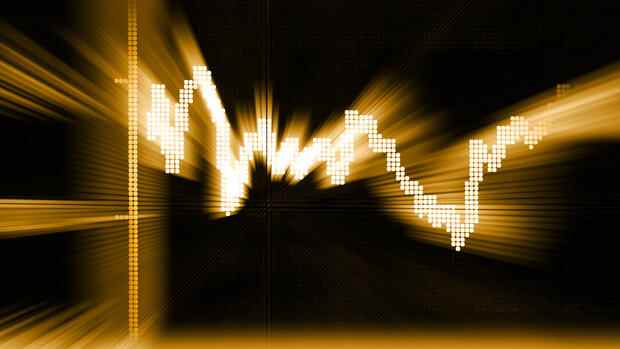Dusseldorf A few hours before the US Federal Reserve’s interest rate decision, the leading German index starts a renewed attempt to recover. The Dax increased by 1.2 percent at noon and traded at 13,457 points. The daily high is 13,510 points. The leading index rose significantly at the start of trading yesterday, Tuesday, but ended trading after a daily high of 13,569 points with a minus of 0.9 percent and a final value of 13,304 points.
But today, Wednesday, there is news that is being received positively on the market. The Governing Council of the European Central Bank is holding a special meeting this Wednesday. According to the spokesman, the current market conditions will be discussed at the meeting. In the past few days, interest rates on the capital markets had risen sharply, while sentiment on the stock market had deteriorated significantly.
This created a dilemma for the ECB. On the one hand, it has to fight inflation. On the other hand, it has to see what high interest rate it can expect from heavily indebted countries like Greece.
The capital markets reacted quickly to this news. Before this report was published at around 7.50 a.m., the Dax was still trading off the floor at around 13,300 points, and is now around 130 points higher. The euro rose to an intraday high of $1.0493 after the meeting was announced. And bond market yields fell significantly. The yield gap on government bonds from Germany and Italy had recently widened.
Top jobs of the day
Find the best jobs now and
be notified by email.
What price drop will the US Federal Reserve tolerate?
0.5 or 0.75 percentage points? That is currently the all-important question on the capital market. What is meant is the amount by which the US Federal Reserve intends to raise interest rates in this country on Wednesday after the market close. 0.75 percentage points are priced in, “only” 0.5 would be a pleasant surprise. And for the next interest rate meeting at the end of July, stock market traders expect another 0.75 percent.
The subsequent press conference with central bank boss Jerome Powell should be correspondingly exciting. Will he also comment on the high losses on the stock market? What price drop will the Fed tolerate? After all, the US selection index S&P 500 is now officially in the bear market. The Dax also lost around 1400 points within a week.
The past trading days have already had traits of a small capitulation. Around 90 million shares were traded, especially on the sessions with the big losses, such as on Friday and Monday. In the past four weeks, however, the average volume per day was below 70 million papers.
For Thomas Altmann from the investment house QC Partners, the markets are trying to bottom out. However, the capital market expert qualifies: “No one can say at the moment whether a bottom has really been found or whether we are just experiencing a breather on the way down”.
The current situation on the German stock market shows how little current valuations play a role, but rather future valuations, chart technology or investor sentiment. And when it comes to the question “Are the shares currently available or cheap?”, a second sentence always plays a decisive role: “Expensive or cheap in relation to what?”.
Dax rating at 2012 level
Because after the high price losses, the historical price-earnings ratio for the Dax is as low as it was last in 2012, Altmann calculated. However, the low valuation hardly attracts buyers. Because the interest rate environment is different.
Ten years ago, the interest rate on a ten-year US Treasury note was 1.64 percent, now it is 3.40 percent. The yield on a ten-year federal bond was also up on the 1.57 percent of ten years ago with a current yield of 1.77 percent before the extraordinary ECB council meeting was announced. In the meantime, the return slipped to 1.69 percent. At the end of May this year, the figure was 1.04 percent.
“On the one hand, bonds are becoming increasingly competitive for stocks,” explains Altmann. “On the other hand, the higher interest rates will put pressure on future profits.” Both of these lead to investors wanting to see more favorable valuations than in the past.
As a result of the announced ECB meeting, investors are buying government bonds from southern European countries again. In contrast, the yield on ten-year paper from Italy fell by more than 20 basis points to 3.99 percent. The interest rate on a Greek government bond with a ten-year term was also 4.7 percent before the report was published; it is currently only 4.56 percent.
Look at the individual values
Drägerwerk: The shares lose 1.8 percent. Traders point to bad figures from competitor Getinge. The Swedish group scaled back its forecast for net sales for 2022.
Gerresheimer: The papers climb by 11.9 percent. Traders point to revived takeover fantasies after the Bloomberg agency reported that the financial investor Bain had recently rejected an offer. The price offered was too low for the packaging manufacturer. “The price was not named, but the report brings lingering fantasies to stocks that have been a little forgotten of late,” said one trader.
Here you can go to the page with the Dax course, here you can find the current tops & flops in the Dax.
